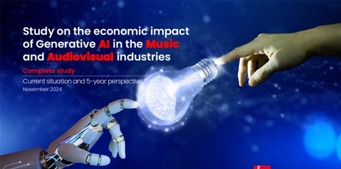 06th December, 2024
06th December, 2024The first ever global study measuring the economic impact of AI in the music and audiovisual sectors calculates that Generative AI will enrich tech companies while substantially jeopardising the income of human creators in the next five years.
This is one of the key findings of the, commissioned by CISAC (International Confederation of Societies of Authors and Composers, representing over 5 million creators), and conducted by PMP Strategy While the revenues of Gen AI providers will see dramatic growth over the next five years, creators risk losing a large share of their current income due to AI’s substitutional impact on human-made works. Despite providing the creative fuel of the “Gen AI” content market, music and audiovisual creators will see respectively 24% and 21% of their revenues at risk of loss by 2028. This amounts to a cumulative loss of €22 billion over the 5-year period (€10 billion in music; €12 billion in audiovisual).
The study finds that the market for music and AV content generated by AI will increase exponentially in the next five years, growing from around €3 billion now to €64 billion in 2028.
The economic study assesses that, as a result of this exponential growth in the market for music and audiovisual content, the future revenues of Gen AI providers will rise to annual revenues of €4 billion in music (up from €0.1 billion in 2023) and €5 billion in audiovisual (up from €0.2 billion) by 2028. These are revenues derived directly from the unlicensed reproduction of creators’ works, representing a transfer of economic value from creators to AI companies.
In the music sector, the streaming and music library markets will be strongly impacted by AI. By 2028, Gen AI music is projected to account for approximately 20% of traditional music streaming platforms’ revenues, and around 60% of music libraries’ revenues.
The projected revenue loss will also be substantial for audiovisual creators. Translators and adaptors for dubbing and subtitling will experience the strongest impact, with 56% of their revenue at risk, while screenwriters and directors could see their revenues cannibalised by 15 to 20%.
The study’s key takeaway
The study concludes: “In an unchanged regulatory framework, creators will actually suffer losses on two fronts: the loss of revenues due to the unauthorised use of their works by Gen AI models without remuneration; and replacement of their traditional revenue streams due to the substitution effect of AI-generated outputs, competing against human-made works”.
Background and methodology
The study is the first of its kind to estimate the economic impact of Gen AI on creators of music and audiovisual productions on a global level. It combines qualitative and quantitative research, using Gen AI application case studies to identify areas of greatest impact and converting these into economic estimates on the market penetration of Gen AI services and the revenue losses to creators. It also provides estimates of Generative AI tools and services’ revenues that can serve as basis to calculate remuneration schemes forcreators. The historical figures and forecast assumptions are based on market data, relevant benchmarks and extensive interviews with industry experts: Collective Management organisations (CMOs), creators, tech players, producers, publishers, DSPs, institutional players representative of these industries, and public institutions.
